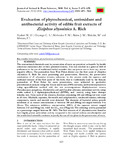| dc.description.abstract | The conventional chemicals used in preservation of meat are perceived as harmful by health
conscious consumers due to their potential toxicity. This has resulted in a general shift of
preference to the use of traditional herbal remedies that are proven not to have any known
negative effects. The pastoralists from West Pokot district use the fruit paste of Ziziphus
abyssinica A. Rich for meat processing and preservation. However, the preservative
mechanism of Z. abyssinica remains unknown. In the present study the aqueous and
methanol extracts of the fruit paste of this herb, that is traditionally used by the Kenyan
pastoralists of West Pokot for meat preservation, were subjected to qualitative
phytochemical analysis using the Trease and Evans (1989) methods; antibacterial properties
using agar-diffusion method with the test microorganisms Staphylococcus aureus,
Pseudomonas aeruginosa, Escherichia coli and Candida albicans; antioxidant activity using
stable radical 2, 2 diphenylpicrylhydrazyl (DPPH), and toxicity using brine shrimps
lethality test. From each of the extracts, fractions containing 100 and 200mg/ml were used
in all tests. Alkaloids, saponins, flavonoids and polyphenolics, condensed tannins, reducing
compounds, sterols and steroids were detected. The diameter of bacterial colony growth
inhibition at an extract concentration of between 100 and 200mg/ml ranged between 9 to
15mm. The minimum inhibitory concentration (MIC) of the aqueous extract ranged
between 3.13 and 50mg/ml, while the LC50 was 270µg/ml. The reducing activity presented
as a percentage ranged between 90 - 96%. The fruit extracts of Z. abyssinica were found to
have highly potent antioxidant activity compared to the control sodium metabisulphite and
the results lend scientific credence to justify the use of this plant in the preservation of meat. | en_US |

